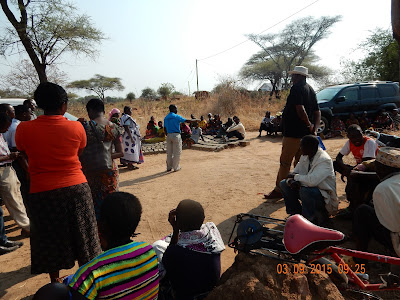LiFELand Baseline Survey (September, 2015)
LiFELand Fieldwork overview
Field work
LiFELand
project research team carried out field work in Iringa and Njombe Region in the
Ihemi Cluster, one among the SAGCOT corridors. The field work lasted for about
20 days starting late August through mid-September 2015. Five districts were
visited including Iringa DC, Kilolo and Mufindi in Iringa Region and
Wanging’ombe and Njombe in Njombe Region. The purpose for the field work was to
discuss with individual farmers within the cluster on issues related to
socio-economic activities, water, and gender related issues. It is the first
field work to be conducted after two stakeholder meetings held in April and
July to discuss issues pertaining the cluster.
 |
| A map of Ihemi Cluster in Tanzania |
How did we do it?
A
group of 24 enumerators joined the research team for field work in the selected
villages. Two days training was provided to enumerators to familiarize them
with the data collection tool. The training was also used as a platform for
enumerators to familiarize with the research team but also among themselves.
The training was held in Iringa Region.
 |
| Enumerators Training |
A
total of 20 villages were visited in the two regions. 607 households’ surveys
(376 in Iringa &231 in Njombe) were conducted in the 20 villages. In
addition 19 focus group discussions were conducted. Focus group discussants comprised
of local/village government leaders and representatives from communities
according to their gender groups (men, women, youth, disabled, female headed
households).
 |
| Prof. Kashaigili giving instructions to enumerators before living to the field |
 |
| Introduction to farmers at Bomalang'ombe village, Kilolo District, Iringa |
 |
| Focus Group Discussion at Makota village, Mufindi District, Iringa |
 |
| Farmers selection for Focus Group Discussion at Kitisi village Iringa rural district |
 |
| Arriving at Igwachanya village, Waging'ombe District |
 |
| Children scrambling for fetching water at Nzivi village |
Lessons learned
Timing
– during the Government election campaign period hence most of the communities
associated the research with the election process. Also, some thought the
process comes with a certain incentive in the end hence provide information
that is not necessarily true representation of what is happening in their area.
Next steps
Data
collected is being processed for analysis and report generation. Recorded
interviews were transcribed and coded using excel spreadsheet for theme
generation. Second field visit is to be conducted soon and will involve
discussion with investors in the area as well as local government authorities
in the study area.
LiFELand Baseline Survey (September, 2015)
 Reviewed by Sustainable Catchment Management through Enhanced Environmental Flow Assessment and Implementation for the protection of the Western Indian Ocean from land-based sources and activities in Tanzania
on
08:24
Rating:
Reviewed by Sustainable Catchment Management through Enhanced Environmental Flow Assessment and Implementation for the protection of the Western Indian Ocean from land-based sources and activities in Tanzania
on
08:24
Rating:
 Reviewed by Sustainable Catchment Management through Enhanced Environmental Flow Assessment and Implementation for the protection of the Western Indian Ocean from land-based sources and activities in Tanzania
on
08:24
Rating:
Reviewed by Sustainable Catchment Management through Enhanced Environmental Flow Assessment and Implementation for the protection of the Western Indian Ocean from land-based sources and activities in Tanzania
on
08:24
Rating:






No comments: